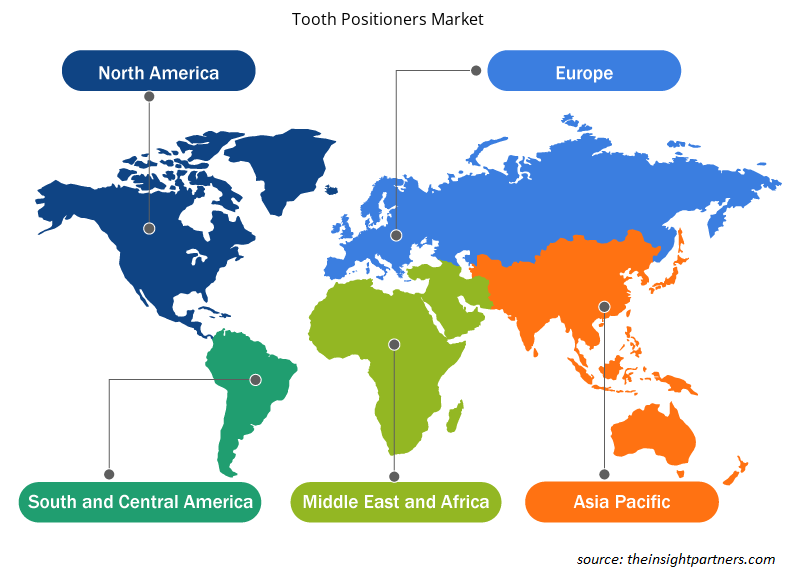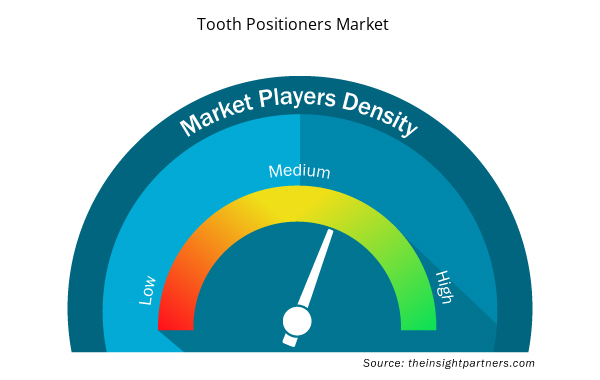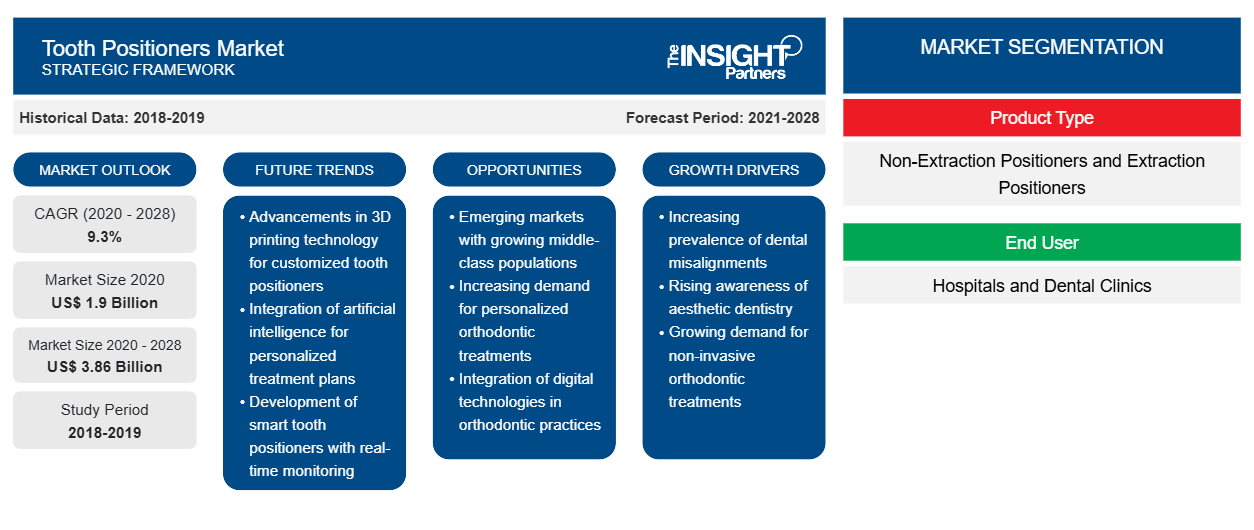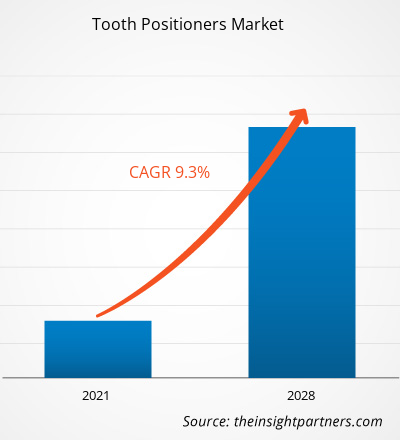El mercado de posicionadores dentales se valoró en US$ 1.901,91 millones en 2020 y se proyecta que alcance los US$ 3.855,65 millones en 2028; se espera que crezca a una CAGR del 9,3% durante 2021-2028.
Los posicionadores dentales son aparatos de ortodoncia muy conocidos que se fabrican como un cuerpo en forma de arco de un material elástico (Silastic); se ajustan perfectamente a la boca del paciente entre las arcadas superior e inferior. Se utilizan para controlar el asentamiento dental y minimizar o eliminar la recaída de los dientes después de un tratamiento de ortodoncia.
La creciente prevalencia de problemas dentales impulsa la adopción de sistemas posicionadores de dientes. Las enfermedades de salud bucal y dental afectan a las personas al menos una vez en la vida. El simple dolor de muelas puede causar dolor insoportable, malestar y desfiguración. Según el informe de la Asociación Dental Americana publicado en 2019, el 50,4% de los niños con Medicaid o CHIP y el 67,1% de los niños con seguro privado visitaron al dentista en 2016. La enfermedad periodontal, que resulta en la pérdida de dientes, ocupa el puesto 11 entre las enfermedades dentales más prevalentes del mundo. La prevalencia de afecciones dentales y bucales como sobremordidas, dientes torcidos, submordidas, mordidas cruzadas, espacios entre los dientes, apiñamiento de dientes y trastornos temporomandibulares (TTM) está aumentando en todo el mundo. Los principales factores que conducen a problemas dentales incluyen lesiones, enfermedades periodontales, accidentes y otros. Según datos de la Asociación Canadiense de Ortodoncistas, aproximadamente 4 millones de personas en Canadá y los EE. UU. están recibiendo tratamiento de un especialista en ortodoncia. Además, según los datos de los Centros para el Control y la Prevención de Enfermedades (CDC), aproximadamente el 31,6 % de la población de los EE. UU. tuvo caries dentales sin tratar durante 2013-2016. Además, según un informe de encuesta publicado en 2018, el 62 % de los sujetos visitó a sus dentistas al menos una vez en 2016, y mientras que el 62 % de ellos tuvo al menos una visita al dentista en 2017, el 52 % hizo su cita más reciente para hacerse un chequeo regular. Por lo tanto, la creciente prevalencia de problemas dentales impulsa el crecimiento del mercado de posicionadores dentales .
Personalice este informe según sus necesidades
Obtendrá personalización en cualquier informe, sin cargo, incluidas partes de este informe o análisis a nivel de país, paquete de datos de Excel, así como también grandes ofertas y descuentos para empresas emergentes y universidades.
- Obtenga las principales tendencias clave del mercado de este informe.Esta muestra GRATUITA incluirá análisis de datos, desde tendencias del mercado hasta estimaciones y pronósticos.
Perspectivas del mercado
La medicina dental cosmética es uno de los procedimientos cosméticos más comunes en el mundo. La Academia Estadounidense de Odontología (AACD) es el principal recurso para los pacientes, ya que les permite mantener su bienestar, rendimiento laboral y apariencia. De acuerdo con la Sociedad Estadounidense de Cirugía Cosmética (ASPS), la odontología ha experimentado un auge reciente con un aumento del 47% en los procedimientos demandados por personas de entre 51 y 64 años. Los costos de la cosmética dental son menores en los países de América del Norte. Los procedimientos típicos de la odontología cosmética y los procedimientos de la odontología cosmética de primera calidad en los países de América del Norte tienen una diferencia de costo de aproximadamente US$ 50 a 150 por corona o carilla. Los dentistas en México tienen laboratorios de alta calidad y ofrecen coronas económicas.
Productos: Perspectivas tecnológicas
El mercado global de posicionadores dentales, según el tipo de producto, se divide en posicionadores sin extracción y posicionadores con extracción. El segmento de posicionadores sin extracción tuvo una mayor participación en el mercado en 2020. Sin embargo, se espera que el mismo segmento registre una CAGR más alta en el mercado durante el período de pronóstico.
Usuario final:
Según el usuario final, el mercado global de posicionadores dentales está segmentado en hospitales y clínicas dentales. El segmento de hospitales tuvo la mayor participación del mercado en 2020, y se espera que el segmento de clínicas dentales registre la CAGR más alta durante 2021-2028.
Los actores que operan en el mercado de posicionadores dentales adoptan estrategias de colaboración y asociación para satisfacer las demandas de los usuarios finales a través de la introducción de ofertas tecnológicamente avanzadas, y estas estrategias respaldan significativamente el crecimiento del mercado.
Perspectivas regionales del mercado de posicionadores dentales
Los analistas de Insight Partners explicaron en detalle las tendencias y los factores regionales que influyen en el mercado de posicionadores de dientes durante el período de pronóstico. Esta sección también analiza los segmentos y la geografía del mercado de posicionadores de dientes en América del Norte, Europa, Asia Pacífico, Oriente Medio y África, y América del Sur y Central.

- Obtenga datos regionales específicos para el mercado de posicionadores dentales
Alcance del informe de mercado de posicionadores dentales
| Atributo del informe | Detalles |
|---|---|
| Tamaño del mercado en 2020 | 1.900 millones de dólares estadounidenses |
| Tamaño del mercado en 2028 | US$ 3.86 mil millones |
| Tasa de crecimiento anual compuesta (CAGR) global (2020-2028) | 9,3% |
| Datos históricos | 2018-2019 |
| Período de pronóstico | 2021-2028 |
| Segmentos cubiertos | Por tipo de producto
|
| Regiones y países cubiertos | América del norte
|
| Líderes del mercado y perfiles de empresas clave |
|
Densidad de actores del mercado de posicionadores dentales: comprensión de su impacto en la dinámica empresarial
El mercado de posicionadores dentales está creciendo rápidamente, impulsado por la creciente demanda de los usuarios finales debido a factores como la evolución de las preferencias de los consumidores, los avances tecnológicos y una mayor conciencia de los beneficios del producto. A medida que aumenta la demanda, las empresas amplían sus ofertas, innovan para satisfacer las necesidades de los consumidores y aprovechan las tendencias emergentes, lo que impulsa aún más el crecimiento del mercado.
La densidad de actores del mercado se refiere a la distribución de las empresas o firmas que operan dentro de un mercado o industria en particular. Indica cuántos competidores (actores del mercado) están presentes en un espacio de mercado determinado en relación con su tamaño o valor total de mercado.
Las principales empresas que operan en el mercado de posicionadores dentales son:
- Ortodoncia TP, Inc.
- Ortodoncia Align
- Laboratorio de ortodoncia Dockstader, Inc.
- DENTAURUM GmbH & Co. KG
- 3M
Descargo de responsabilidad : Las empresas enumeradas anteriormente no están clasificadas en ningún orden particular.

- Obtenga una descripción general de los principales actores clave del mercado de posicionadores de dientes
Por tipo de producto
- Posicionadores sin extracción
- Posicionadores de extracción
Por el usuario final
- Hospitales
- Clínicas dentales
Por geografía
América del norte
- A NOSOTROS
- Canadá
- México
Europa
- Francia
- Alemania
- Italia
- Reino Unido
- España
Asia Pacífico
- Porcelana
- India
- Corea del Sur
- Japón
- Australia
Oriente Medio y África
- Sudáfrica
- Arabia Saudita
- Emiratos Árabes Unidos
América del Sur y Central
- Brasil
- Argentina
Perfiles de empresas
- Ortodoncia TP, Inc.
- Ortodoncia Align
- Laboratorio de ortodoncia Dockstader, Inc.
- DENTAURUM GmbH & Co. KG
- 3M
- DENTSPLY Sirona
- Ortodoncia G&H
- Dynaflex
- Laboratorios dentales Protec
- Laboratorios dentales Johns
- Análisis histórico (2 años), año base, pronóstico (7 años) con CAGR
- Análisis PEST y FODA
- Tamaño del mercado Valor/volumen: global, regional, nacional
- Industria y panorama competitivo
- Conjunto de datos de Excel



Report Coverage
Revenue forecast, Company Analysis, Industry landscape, Growth factors, and Trends

Segment Covered
This text is related
to segments covered.

Regional Scope
North America, Europe, Asia Pacific, Middle East & Africa, South & Central America

Country Scope
This text is related
to country scope.
Preguntas frecuentes
The uneasiness and inconvenience caused by tooth positioners is the significant factor that will hinder the tooth positioners market growth.
The global tooth positioners market is being driven by factors such as rising prevalence of dental problems and increase in demand for dental cosmetic procedures are likely to offer significant opportunities for the growth of the global tooth positioners market.
TP Orthodontics, Inc., Align Orthodontics, Dockstader Orthodontic Lab, Inc., DENTAURUM GmbH & Co. KG, 3M, DENTSPLY GAC International, G&H Orthodontics, DynaFlex, LM-Instruments Oy., Johns Dental Laboratories and among others are major companies operating in this market.
Trends and growth analysis reports related to Life Sciences : READ MORE..
The List of Companies - Tooth Positioners Market
- TP Orthodontics, Inc.
- Align Orthodontics
- Dockstader Orthodontic Lab, Inc.
- DENTAURUM GmbH & Co. KG
- 3M
- DENTSPLY Sirona
- G&H Orthodontics
- DynaFlex
- Protec Dental laboratories
- Johns Dental Laboratories
The Insight Partners performs research in 4 major stages: Data Collection & Secondary Research, Primary Research, Data Analysis and Data Triangulation & Final Review.
- Data Collection and Secondary Research:
As a market research and consulting firm operating from a decade, we have published and advised several client across the globe. First step for any study will start with an assessment of currently available data and insights from existing reports. Further, historical and current market information is collected from Investor Presentations, Annual Reports, SEC Filings, etc., and other information related to company’s performance and market positioning are gathered from Paid Databases (Factiva, Hoovers, and Reuters) and various other publications available in public domain.
Several associations trade associates, technical forums, institutes, societies and organization are accessed to gain technical as well as market related insights through their publications such as research papers, blogs and press releases related to the studies are referred to get cues about the market. Further, white papers, journals, magazines, and other news articles published in last 3 years are scrutinized and analyzed to understand the current market trends.
- Primary Research:
The primarily interview analysis comprise of data obtained from industry participants interview and answers to survey questions gathered by in-house primary team.
For primary research, interviews are conducted with industry experts/CEOs/Marketing Managers/VPs/Subject Matter Experts from both demand and supply side to get a 360-degree view of the market. The primary team conducts several interviews based on the complexity of the markets to understand the various market trends and dynamics which makes research more credible and precise.
A typical research interview fulfils the following functions:
- Provides first-hand information on the market size, market trends, growth trends, competitive landscape, and outlook
- Validates and strengthens in-house secondary research findings
- Develops the analysis team’s expertise and market understanding
Primary research involves email interactions and telephone interviews for each market, category, segment, and sub-segment across geographies. The participants who typically take part in such a process include, but are not limited to:
- Industry participants: VPs, business development managers, market intelligence managers and national sales managers
- Outside experts: Valuation experts, research analysts and key opinion leaders specializing in the electronics and semiconductor industry.
Below is the breakup of our primary respondents by company, designation, and region:

Once we receive the confirmation from primary research sources or primary respondents, we finalize the base year market estimation and forecast the data as per the macroeconomic and microeconomic factors assessed during data collection.
- Data Analysis:
Once data is validated through both secondary as well as primary respondents, we finalize the market estimations by hypothesis formulation and factor analysis at regional and country level.
- Macro-Economic Factor Analysis:
We analyse macroeconomic indicators such the gross domestic product (GDP), increase in the demand for goods and services across industries, technological advancement, regional economic growth, governmental policies, the influence of COVID-19, PEST analysis, and other aspects. This analysis aids in setting benchmarks for various nations/regions and approximating market splits. Additionally, the general trend of the aforementioned components aid in determining the market's development possibilities.
- Country Level Data:
Various factors that are especially aligned to the country are taken into account to determine the market size for a certain area and country, including the presence of vendors, such as headquarters and offices, the country's GDP, demand patterns, and industry growth. To comprehend the market dynamics for the nation, a number of growth variables, inhibitors, application areas, and current market trends are researched. The aforementioned elements aid in determining the country's overall market's growth potential.
- Company Profile:
The “Table of Contents” is formulated by listing and analyzing more than 25 - 30 companies operating in the market ecosystem across geographies. However, we profile only 10 companies as a standard practice in our syndicate reports. These 10 companies comprise leading, emerging, and regional players. Nonetheless, our analysis is not restricted to the 10 listed companies, we also analyze other companies present in the market to develop a holistic view and understand the prevailing trends. The “Company Profiles” section in the report covers key facts, business description, products & services, financial information, SWOT analysis, and key developments. The financial information presented is extracted from the annual reports and official documents of the publicly listed companies. Upon collecting the information for the sections of respective companies, we verify them via various primary sources and then compile the data in respective company profiles. The company level information helps us in deriving the base number as well as in forecasting the market size.
- Developing Base Number:
Aggregation of sales statistics (2020-2022) and macro-economic factor, and other secondary and primary research insights are utilized to arrive at base number and related market shares for 2022. The data gaps are identified in this step and relevant market data is analyzed, collected from paid primary interviews or databases. On finalizing the base year market size, forecasts are developed on the basis of macro-economic, industry and market growth factors and company level analysis.
- Data Triangulation and Final Review:
The market findings and base year market size calculations are validated from supply as well as demand side. Demand side validations are based on macro-economic factor analysis and benchmarks for respective regions and countries. In case of supply side validations, revenues of major companies are estimated (in case not available) based on industry benchmark, approximate number of employees, product portfolio, and primary interviews revenues are gathered. Further revenue from target product/service segment is assessed to avoid overshooting of market statistics. In case of heavy deviations between supply and demand side values, all thes steps are repeated to achieve synchronization.
We follow an iterative model, wherein we share our research findings with Subject Matter Experts (SME’s) and Key Opinion Leaders (KOLs) until consensus view of the market is not formulated – this model negates any drastic deviation in the opinions of experts. Only validated and universally acceptable research findings are quoted in our reports.
We have important check points that we use to validate our research findings – which we call – data triangulation, where we validate the information, we generate from secondary sources with primary interviews and then we re-validate with our internal data bases and Subject matter experts. This comprehensive model enables us to deliver high quality, reliable data in shortest possible time.


 Obtenga una muestra gratuita de este informe
Obtenga una muestra gratuita de este informe